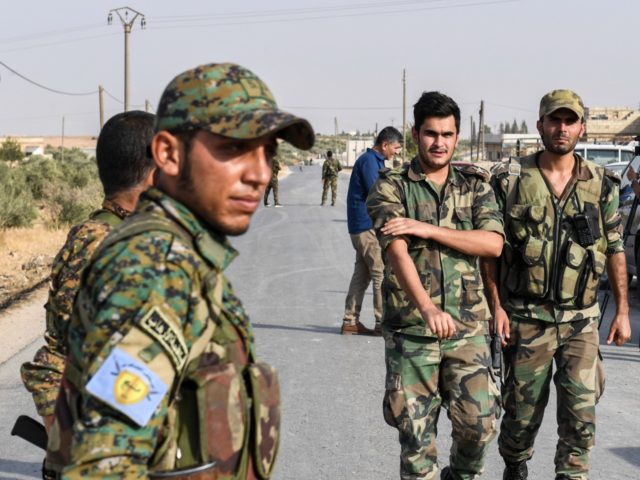The Syrian Democratic Forces (SDF), a formerly U.S.-allied coalition largely made up of Kurdish fighters, accused the Turkish military and its proxies of genocide against the Kurdish people on Wednesday and using tactics “similar to ISIS.”
President Recep Tayyip Erdogan of Turkey announced “Operation Peace Spring” last week, an invasion of Syrian Kurdistan (Rojava) intended to eradicate the SDF’s forces and the Kurdish presence generally to create a “safe zone” for Arab Syrian refugees currently stranded in Turkey. Kurdish leaders call the replacement of indigenous Kurdish populations with largely Arab refugees an attempt at ethnic cleansing; Ankara claims it necessary because the Kurds are “terrorists.”
Turkey considers the Syrian Kurdish People’s Protection Units (YPG/YPJ), who make up most of the SDF, indistinguishable from the Kurdistan Workers’ Party (PKK), a U.S.-designated Marxist terrorist group. The YPG were integral to the defeat of the Islamic State in Syria and responsible for most of the fighting in the liberation of Raqqa, the “capital” of the Islamic State caliphate.
The Turkish invasion – aided by the Free Syrian Army (FSA), a coalition of Syrian Arab rebel groups including some jihadist elements – followed President Donald Trump’s decision to relocate a small contingent of 50 U.S. soldiers out of Rojava. America’s military presence is only legal to fight the Islamic State, an al-Qaeda offshoot, as per the 2001 Congressional Authorization for the Use of Military Force (AUMF) against al-Qaeda.
The SDF stated in a press release Wednesday that Turkey had begun using Syrian civil war refugees to enact “demographic change in Rojava” and were using “all kinds of weapons” to eradicate the Kurds.
“The practices of the Turkish affiliated forces are similar to ISIS, even though these forces have different names,” the Syrian Democratic Council, the civilian wing of the SDF, said.
“The Autonomous Administration reaffirms that what Turkey is doing amounts to genocide and occupational practices,’ the statement continued. “We appreciate the positions of the regional and international powers, and all legal and human rights organizations that condemned this aggression.”
The council accused the Turks and their proxies of “terrorism” and vowed to “remain committed to restore [sic] stability and security” in Kurdistan.
Speaking to the Kurdish outlet Rudaw, medical professionals treating the civilian victims of the Turkish onslaught suggested that they are showing signs of having been attacked with chemical weapons.
“There are a lot of fears that prohibited weapons are being used in Sari Kani. Wounds we treat at the hospitals are not normal injuries at all,” Dr. Manal Mohammed, head of the Rojava Health Board, which is treating many of the victims, told Rudaw. “Our health board is currently investigating to find out what type of weapon is being used against us. Like I said, wounds we treat are not normal at all.”
SDF spokesman Mustafa Bali posted a video of children covered in what appeared to be acid burns, stating that the SDF believes “unconventional weapons are being used” by either the Turkish military or the FSA.
[Warning: graphic video]
After 8 days of fierce resistance by our fighters against heavy ground and aerial attacks of Turkey in Serêkaniyê, we suspect that unconventional weapons are used against SDF fighters upon the reports and signs we receive from the besieged town. 1/2 pic.twitter.com/Epr1BsDFhC
— Mustafa Bali (@mustefabali) October 16, 2019
While the SDF have been careful to refer to the weapons as merely “banned” or “unconventional,” Rudaw noted that at least one Kurdish official has speculated that the weapons being used as napalm and phosphorus gas, chemical weapons banned by international law. Bali reportedly stated that the doctors treating the victims believed to have been exposed to banned chemicals lack the technology required to properly identify the specific type of chemicals used.
The Turkish government has adamantly denied possessing banned chemical weapons or using them; the FSA has not at press time issued any statement in its defense.
Chemical weapons use has been a central recurring theme of the Syrian Civil War nearly since its inception in 2011, when the only actors participating in it were dictator Bashar al-Assad and the Free Syrian Army rebels. Assad has faced accusations of chemical weapons use on multiple occasions and faced military repercussions, including attacks from the United States, for allegedly using the weapons. One study found evidence for at least 300 separate chemical weapon attacks by Assad during the span of the war.
In 2016, Erdogan, a Sunni Islamist, announced Turkey’s intention to invade Syria “to end the rule of the tyrant Assad, who terrorizes with state terror.” Assad is an Alawite Shiite and is allied with the world’s largest Shiite nation, Iran.
Erdogan insisted that any Turkish military activity in Syria would not be “for any other reason” than deposing Assad.
Assad’s Syrian Arab Army has allied with the SDF in light of American troops leaving the region, as Congress has yet to authorize President Trump to send troops to defend the Kurds. Assad forces have reportedly moved into key Rojava towns and cities, like the border town of Kobani, to protect it from Turkish attack.
The Turkish government has adamantly denied the use of chemical weapons. It has nonetheless boasted through state media and friendly publications – the only ones left after Erdogan’s media purges in 2016, save for the opposition newspaper Cumhuriyet – that its military has “neutralized” nearly 700 Kurdish “terrorists,” the former a term Turkey uses to mean fighters killed or imprisoned, but currently no longer able to remain on the battlefield. Turkish officials claim to have “liberated” 1,220 square kilometers of territory of its Kurdish population and seized “130 long-barreled guns, 180 hand grenades, 17,871 ammunition, 27,534 kilograms (60,702 pounds) of explosive material, 10 rocket launchers, [and] 232 rocket launchers ammunition.”

COMMENTS
Please let us know if you're having issues with commenting.